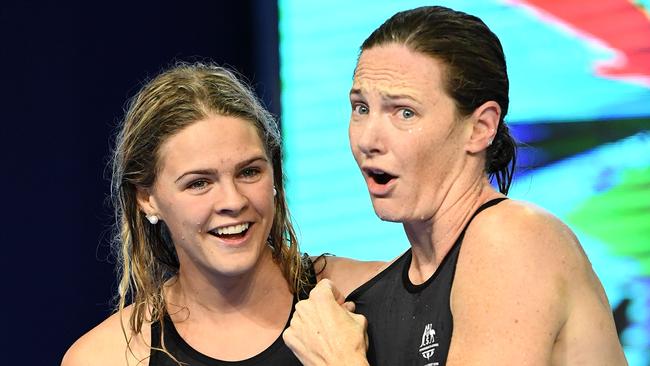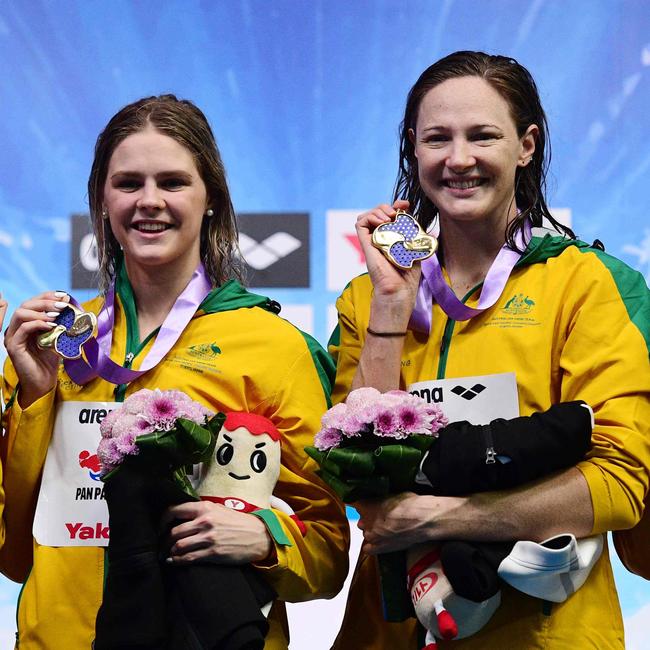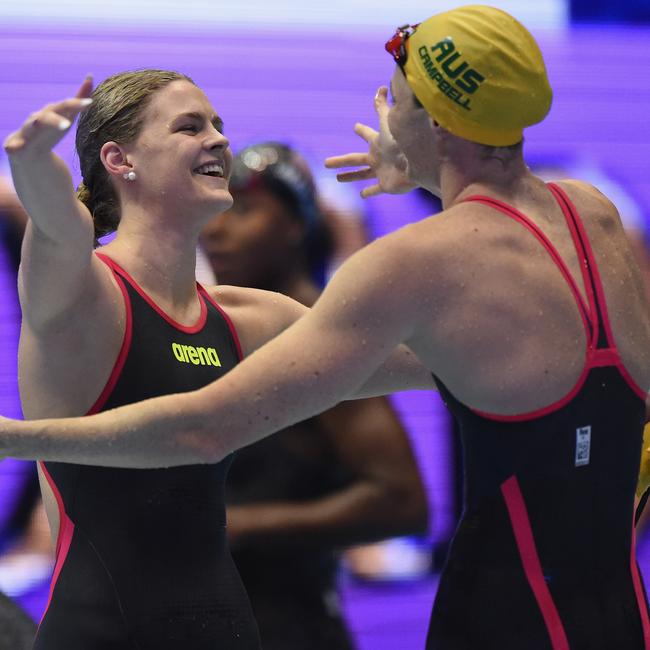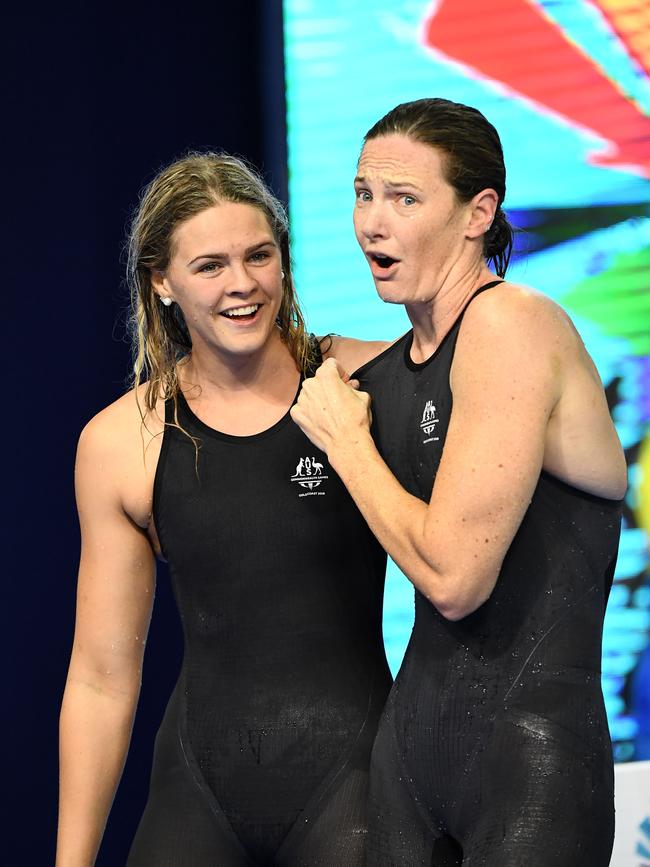Cate Campbell: Support for Shayna Jack and the fight against drug cheats are not mutually exclusive
There is no place for drugs in sport, writes Cate Campbell, but we must not lose sight of the price paid by innocent athletes.

Olympics
Don't miss out on the headlines from Olympics. Followed categories will be added to My News.
The world of elite sport is a scary place. Standing behind the starting blocks of an Olympic Games, is one of the most exciting and terrifying places you can find yourself.
However, in the light of the Shayna Jack positive drug test saga, something as innocent as ordering a smoothie from your local cafe could potentially have life-changing consequences – which is a much more terrifying thought.
Last Tuesday the Court of Arbitration for Sport (CAS) handed down its ruling on Shayna Jack’s appeal for a positive drug test from June 2019.
Kayo is your ticket to the best sport streaming Live & On-Demand. New to Kayo? Get your 14-day free trial & start streaming instantly >

Seventeen months after the initial positive result, Jack was finally able to prove she did not knowingly ingest trace elements of the prohibited substance Ligandrol, and reduce her ban from four years to two years.
She will be able to resume training in July of 2021 – ruling the 21-year-old out of the Tokyo 2021 Olympics.
Drugs in sport has been a hotly contested topic in recent years, and Australia and its athletes have been known for their hard, and often public, stance against drugs in sport.
I fall into both those categories; I have a zero tolerance for drugs in sport – an opinion I have made public and still stand by.
Yet, I support Shayna Jack – a stance, which, if you only read the news headlines seems woefully hypocritical.
However, let me explain how it is possible to have a zero tolerance for drugs in sport and still support Shayna Jack.
I am going to preface this by saying I am not, and have not been, privy to the details of the CAS hearing nor any of the legal process in this case.

I am basing my opinion on the information I have at my disposal and from my lived experience of being an elite athlete for the past 16 years.
Olympic athletes must comply with the World Anti-Doping Agency’s (WADA) Code to be allowed to compete, and the Australian Anti-Doping Authority (ASADA) is responsible for enforcing the code in Australia.
This is one of the strictest anti-doping codes in the world and I would like to give you a glimpse into what it means to be governed by this Code – how rigorous and intrusive it can be.
It’s common knowledge random drug testing is one of the most effective ways to curb doping in sport. For athletes however, this means adhering to strict rules which impinge both on privacy and dignity.
We are required to provide the Anti-Doping Authorities with detailed information about their daily whereabouts. For each day of the year, we are required to provide our overnight address
– and give an hour and a location every day where we must be, should the drug testers decide to come and test us – however, they can come outside our hour as well.

I have been drug tested at 11pm at night, 5am in the morning, in the middle of a dinner party, and at a grimy backpackers in Berlin while on holiday.
Once notified for a test, the drug testers do not leave until a suitable sample is produced – 90ml of urine which is not too diluted from over-hydration. This can take hours.
I have been forced to wait up to five hours before being able to provide an adequate sample.
Then there is the actual test itself: an athlete must strip from the chest down, and provide a urine sample in full and unobstructed view of a chaperone (as one chaperone was kind enough to remind to me while I was providing my sample “this is great, I can see everything!”. (Mid-stream, squatting above the toilet, with my pants at my ankles, I definitely didn’t need the reminder).
It is a necessary, relentless, and invasive process.
Under the Code, we are 100 per cent responsible for what is put in, and what is found in our bodies.
However, contention arises when what we put in our bodies and what is found in our bodies are two different things. Contamination of substances has long been an issue in sport. In all our Anti-Doping education, we are strongly advised against taking supplements or medications of any kind.
Should traces of substances not listed on the ingredients list be present in anything we ingest, this could result in a positive test.
To give some real-world examples, if an athlete orders a protein ball at a cafe – and that protein ball contains protein powder with traces of a prohibited substance in it, the athlete could test positive.
If an athlete lives in a share-house and uses the same smoothie blender as their housemates – if that blender contains trace elements of a contaminated substance, the athlete could test positive.
If an athlete uses a public gym, and the gym equipment has traces of prohibited substances on it, and the athlete uses the equipment and then eat without washing their hands, they could test positive.
I am of the opinion that it is near impossible to intentionally dope in Australia.
To evade the frequency of our tests – I have been tested twice in one day – the constant adherence to whereabouts, and the minute degree of substance detection in the tests, would require a level of sophistication and expense well out of the means of 99.9% of Australian Olympians.
It is therefore reasonable to assume it is possible to return a positive drug test without being a ‘drug cheat’.
The policy enforced by ASADA is black and white. A positive test equals guilty. A negative test: innocent. If Jack’s case has taught us anything – its that the world of anti-doping exists in more than 50 shades of grey, it’s almost technicoloured.
Let’s also not forget, Lance Armstong never retuned a positive test. Keeping sport clean comes at a cost – a cost Shayna Jack knows only too well.
While there is immense focus on catching the guilty athletes, equal time and effort should be put towards protecting the innocent ones. Until this happens, I’ll be keeping clear of the protein smoothies.




